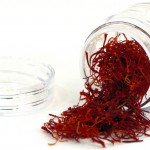New research reveals saffron’s potential to prevent deadly forms of cancer
 (NaturalHealth365) The benefits of saffron can be traced back several centuries cross-culturally around the globe. As a staple in the Mediterranean diet, we have long observed the beneficial health effects – on a clinical basis – including its ability to prevent cancer.
(NaturalHealth365) The benefits of saffron can be traced back several centuries cross-culturally around the globe. As a staple in the Mediterranean diet, we have long observed the beneficial health effects – on a clinical basis – including its ability to prevent cancer.
In fact, back in the days of Galen and Hippocrates, this beautiful plant was used to counter the effects of colds, coughs, insomnia, and even heart ailments. And today, we now have robust scientific data to suggest that saffron can effectively prevent even the most aggressive and deadly forms of cancer by protecting the integrity of our DNA.
Saffron outperforms one-dimensional dangerous cancer drugs while protecting DNA
What makes saffron so unique as opposed to harmful, synthetic chemicals are its multi-stage, therapeutic effects against cancer.
Carotenoids in saffron – crocetin, crocin, and safranal confer – directly protect us against genetic damage, specifically DNA damage due to chemotherapy. Additionally, saffron has been observed to prevent new cancer growth by slowing and preventing DNA damage typically related to radiation therapy and the inflammation resulting from free radical exposure.
Understanding the ‘multi-stage’ cancer-fighting properties of saffron
Multi-dimensional cancer-fighting therapeutic saffron confronts cancer at all stages of the disease process, from prevention to reversal.
Carcinogenesis, the process by which cancer cells develop and become malignant, has been shown to be reduced by the plant. Studies support how saffron inhibits many of the epigenetic triggers that initiate the carcinogenic process, such as environmental toxins and viral influences.
Saffron slows and prevents the most deadly forms of cancer
Liver, lung, and stomach cancer are known as the deadliest forms of cancer. Tumors and tissue damage in these organs as a result of cancer have been shown to decrease and cease when saffron treatment is introduced.
Saffron was also found to elicit direct and mutually enhancing effects when combined with other cancer therapeutics. In the case of stomach cancer, blood levels of protective compounds that suppress cancer increase when combined with stomach cancer medication. For lung cancer, saffron induced cancer cell apoptosis (programmed cell death).
How to stop cancer from rapidly spreading in its tracks
Rapidly growing cancer cells impose a double threat to the immune system – their altered state significantly taxes the immune system, lowering its ability to fend off opportunistic pathogenic influences while creating widespread inflammation.
With saffron, prevention of rapid cancer cell growth has been observed in cases of pancreatic, lung, colon, and breast cancer growth. In the case of pancreatic cancer, one of saffron’s many carotenoids, crocetin, when given orally after cancer tumors had been observed, was able to slow and reverse cancer.
Saffron is safer than most conventional cancer drugs
Despite the billions of dollars poured into cancer research and treatment in the United States, modern conventional treatments continue to impose serious and life-threatening side effects on patients. Researchers point out that, unlike current pharmacological therapeutics, saffron did not damage or endanger any healthy cellular activity and was only active against cancer cells in studies.
To date, there have not been any documented cases of tissue damage or blood coagulation – two harmful effects related to common cancer treatments.
Because so many therapeutics are still only focused on treatment once cancer has developed, saffron’s cancer-preventive properties continue to attract research funding. Current and future saffron research will look at how the therapeutic works at an advanced genetic level – specifically genetic expression so that its preventive properties can be fully understood.
Of course, one final note, we do not suggest that you use saffron as a single method of treating cancer. Find an experienced healthcare provider that can design a comprehensive, anticancer program that’s best for you.
Discover the best ways to avoid the threat of cancer: Own the Stop Cancer Docu-Class, an educational program created by Jonathan Landsman.
Sources for this article include:



